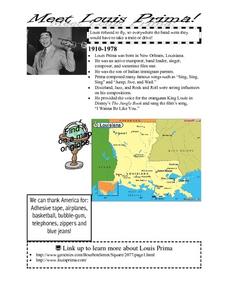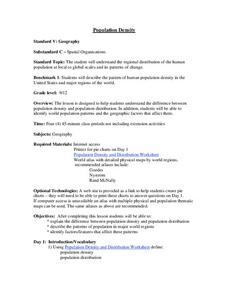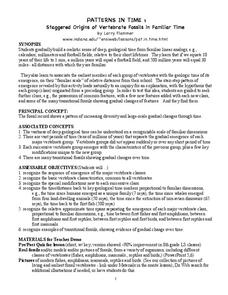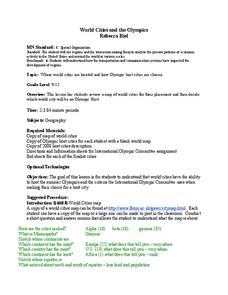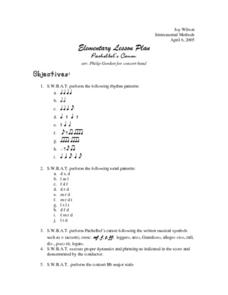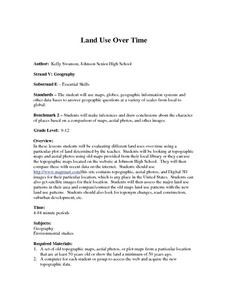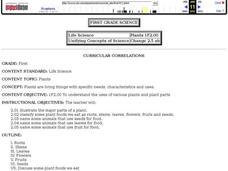Curated OER
Tetrachords and Major scales
Students explore and analyze the structure of a tetrachord and major scales along with their origins and functions in music. They recognize tetrachords and major scales in the context of the music they are practicing at this point in...
Curated OER
Music Composition
Learners compose a simple melody using the notes of the D Major Scale. Criteria/Rubric for evaluation is provided with variations depending on skill level of students. A minimum of one forty-five minute class period is needed for this...
Curated OER
Mining in a Nutshell
Your class will love this geology-inspired set of activities that demonstrate the processes through which we are able to use mineral resources. They describe the major steps that a company must follow from initial discovery of a mineral...
Curated OER
Building a Scale Model
Third graders create a model of the solar system. In this solar system lesson, 3rd graders create a scale model of the solar system. Working in pairs students solve mathematical problems to correctly measure the distance each planet is...
Curated OER
Three D Constellations
Students address a major misconception in astronomy, the understanding of scale. The lesson is designed to introduce students to both celestial coordinates and to the first rung on the distance determination ladder, parallax.
Curated OER
J.S. Bach (1685-1750): Sarabande and Gigue form Partita no.4 in D major, BWV 828
Challenge your music students with this worksheet, which includes twenty-one questions about J.S. Bach's Sarabande and Gigue form Partita no.4 in D major, BWV 828. Students compare the two sections (bars 1-12, bars 13-38) by answering...
Curated OER
Our Solar System - Comparing Planetary Travel Distances
NASA presents a mini-unit on distances in our solar system. It incorporates scientific concepts of gravity, mass, density, and payload while your aspiring astronauts also employ mathematics skills. They calculate speed, they determine...
Contemporary Arts Center
Mughal Miniature Paintings: Pattern Transformations
What is the artist's role in the post 9/11 world? How do artists use imagery to convey meaning in their work? After examining the work of Mughal artist Imran Qureshi, class members create their own work that uses combative imagery to...
Curated OER
Indian Ragas
Young scholars explore Indian ragas and learn the differences between an Indian raga and the Western scale. They sing the familiar song "America," first in the Western major scale and then in two Indian ragas (bhairavi and purvi) on a...
Curated OER
Rhythm, Math, Rhythm
Students play instruments in math class to learn the interconnectedness between math and music. In this math lesson, students subdivide a piece of music, clapping rhythms and charting rhythm patterns in the song. A guided discussion...
Berklee College of Music
Create Your Own Afro-Latin Groove
The backbone of Latin American music is the beat! Young musicians work on blending Afro-Latin rhythms and beat patterns before incorporating the major pentatonic, minor pentatonic, and blues scales in their own compositions.
Curated OER
Getting it Right! An Investigation of the Pythagorean Theorem
In order to learn about the Pythagorean Theorem, young mathematicians investigate relations and patterns between different sides of a right triangle to look for possible relations among the squared sides. Once they have established the...
Curated OER
Meet Louis Prima!
Students discover the difference in major and minor tonality after a brief introduction to Louis Prima. They discuss swing dancing and Louis Prima's role in the "Jungle Book" as the character King Louis. Students listen to the song...
Curated OER
Population Density
Students examine world population density and population distribution. They create pie charts showing population distribution and analyze population patterns in the United States and major regions of the world. They identify...
Curated OER
The Tennessee River: The Tie That Binds
Seventh graders examine the Tennessee River to see why it is still a major transportation artery in lieu of the age of modern transportation such as interstate highways, air cargo, and elaborate railway systems.
Curated OER
Patterns In Time
Seventh graders examine fossils. In this vertebrate fossils instructional activity students view a demonstration.
Curated OER
World Cities and the Olympics
High schoolers examine the various cities in which Olympics have been held. Using a map, they describe the reasons why those cities were chosen and choose their own city for the Olympics and state the reasons why. They examine...
Curated OER
Planning a Healthy City
Ninth graders create a scaled model city. They create a blueprint that provides for the economic and cultural needs of a community. They identify where essential elements of the city should be located and explain the rationale for the...
Curated OER
HIV/AIDS And Contemporary Population Dynamics
Students describe the spread and occurence of HIV/AIDS at multiple scales. They explain global and regional variations in the occurence of HIV/AIDS and explain the spread of HIV/AIDS in the United States.
Curated OER
Pachelbel's Canon
Students warm up by playing rhythm and tonal patterns. They perform Pachelbel's canon and recognize written musical symbols such as cres., leggero, arco, Grandioso, allegro vivo, rall, div, poco rit, and legato. As the band performs,...
Curated OER
Land Use Over Time
Students view aerial photos and topographic maps of their local area. They compare and contrast major land use patterns over time by comparing these images to maps that are at least 50 years old. They analyze them using the four land use...
Curated OER
Ocean Currents
Fourth graders work in groups to research ocean currents and create posters with their findings. They locate the patterns and names of major ocean currents and identify them on a map. Students also use red pencil to show ocean currents...
Curated OER
The Ocean Floor
Fifth graders discuss the process of sedimentation and the continental drift theory. They locate major structures on the ocean floor and they identify life forms at each level of the ocean.
Curated OER
Plants
Young scholars illustrate the major parts of a plant, classify some plant foods we eat as roots, stems, leaves, flowers, fruits and seeds. They also name some animals that use seeds, leaves, and fruit for food.












